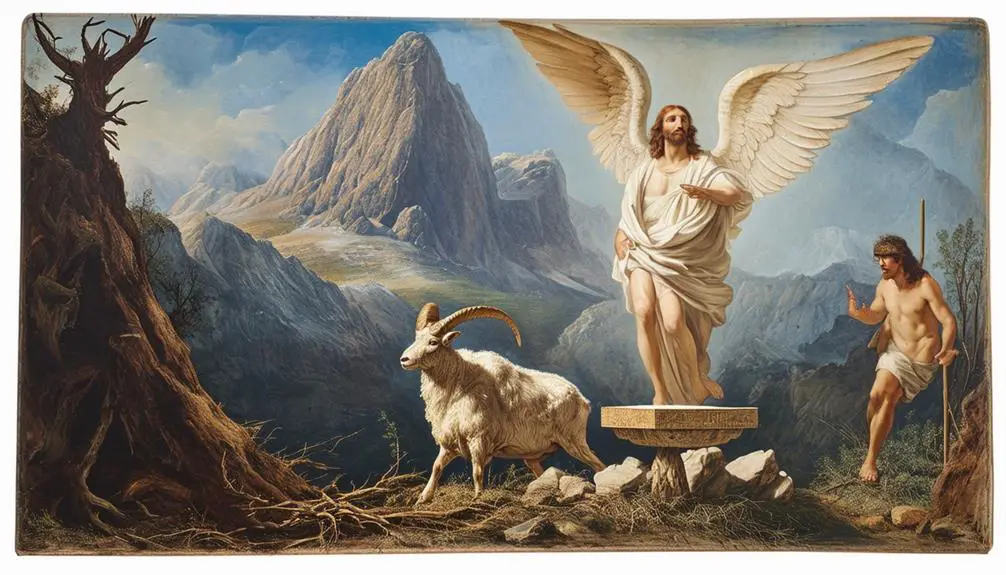Analyze Genesis 22, an intense chapter that tests Abraham's faith and displays divine providence, while unraveling its theological implications and symbolic ties to future events.

Bible Study – The Book of Genesis – Chapter 22 – Summary and Analysis
In Genesis 22, you witness Abraham's faith pushed to its extremes with God's order to sacrifice Isaac. The unfolding events give you glimpses of Isaac's strength and resilience, along with showcasing God's divine intervention. This chapter's narrative intricately tackles faith, obedience, and divine providence, hinting at significant theological implications. It's filled with symbolic elements like the ram and Moriah, tying the narrative to future covenantal events. Examining this chapter further reveals its layered complexities, enriching your understanding of Abraham's spiritual journey, and inviting you to uncover more profound insights.
Key Takeaways
- Genesis 22 showcases Abraham's unwavering faith and obedience when God tests him by asking him to sacrifice his son, Isaac.
- Isaac's passive role in the narrative emphasizes his resilience and mirrors Abraham's faith, presenting an ethical dilemma of sacrifice and obedience.
- The chapter features divine intervention, with an angel stopping Abraham from sacrificing Isaac, which confirms his faith and highlights the paradox of obedience.
- Modern interpretations of Genesis 22 probe into Abraham's existential crisis, ethical complexities, total submission to God, and emotional torment.
- Genesis 22 contains symbolic offerings like the ram and the location Moriah, while Isaac carrying the wood for the sacrifice mirrors Christ's journey bearing the cross.
Chapter 22 Overview

Diving into Genesis Chapter 22, you'll find a deeply symbolic and theologically rich narrative that continues to shape Christian understanding and belief. The Genesis chronology, as presented in this chapter, provides a pivotal juncture in the Patriarchal narratives, showcasing Abraham's unquestioning obedience to God's command.
You'll notice that the narrative is marked by its intense dramatic irony. While Abraham is acutely aware of the impending sacrifice, Isaac, his son, is oblivious. This tension underpins the entire chapter, driving the narrative forward. The Genesis chronology reveals a deliberate progression, building up to the climactic moment of potential sacrifice.
The chapter's structure further underscores its theological significance. The narrative's flow is broken by dialogue, serving as pauses that heighten dramatic tension while also providing important theological insights. You'll see that God's intervention at the pivotal moment of sacrifice establishes a crucial point in the Genesis chronology.
Genesis Chapter 22, in its entirety, encapsulates the complexity of the Patriarchal narratives. It balances the delicate interplay between human obedience and divine intervention, presenting a compelling narrative that continues to resonate in contemporary Christian thought. Through a careful study of this chapter, you'll gain a deeper understanding of these foundational narratives.
Key Characters Analysis
In analyzing the key characters of Genesis 22, you'll confront Abraham's faith, scrutinize the narrative of Isaac's near-sacrifice, and examine the miraculous intervention that occurred. You'll find value in dissecting Abraham's unquestioning obedience to God's command and what it reveals about his character. Moreover, understanding the significance of Isaac's passive role and the divine intervention's timing will provide you with a deeper comprehension of these biblical narratives.
Abraham's Faith Tested
Examining the character of Abraham, you'll find a man whose faith is tested to its very limits in Genesis Chapter 22. This faith testing is a pivotal theme, showcasing Abraham's profound divine obedience. As a paragon of faith, he receives an unthinkable command from God – to sacrifice his beloved son, Isaac. Yet, instead of rebelling or questioning, Abraham displays an unwavering commitment to God's will. He prepares to follow through, demonstrating an unparalleled level of faith in divine wisdom. This incident is not just a test of Abraham's faith, but also a reflection of his character. His readiness to sacrifice what he cherishes most encapsulates his absolute obedience and trust in God, thereby setting a significant benchmark for faith in biblical narrative.
Isaac's Sacrifice Analysis
Let's explore the analysis of Isaac's sacrifice, focusing on the key characters and their roles within this pivotal biblical narrative. Two key elements emerge in this story: Isaac's resilience and sacrificial ethics. Isaac, a passive figure, exhibits resilience, not questioning his father Abraham's actions, even when he's bound for sacrifice. This silent strength showcases Isaac's faith, mirroring Abraham's. Abraham embodies sacrificial ethics, willing to offer his beloved son to demonstrate his unwavering faith in God. His obedience to God, even when it challenges his moral compass, is profound and unsettling. This narrative urges us to wrestle with the tension between faith and morality. It's a powerful exploration of sacrifice, obedience, and faith, all intertwined in a complex ethical dilemma.
Miraculous Intervention Explored
Delving into the miraculous intervention, you'll find an intricate tapestry of characters, each playing a pivotal role in the unfolding drama of Genesis 22. The divine intervention is manifested in the form of an angel who halts Abraham's hand, saving Isaac from sacrifice. This episode serves as a faith trial for Abraham, questioning his obedience and devotion to God.
Abraham's unwavering faith, despite the challenging task, is a confirmation of his spiritual fortitude. The angel's intervention is not just a rescue mission, but also a reward for Abraham's faithfulness. In this scenario, divine intervention intertwines with faith trials, highlighting the Biblical principle that genuine faith is often tested and rewarded. The miraculous intervention in Genesis 22 underscores an essential paradox of faith: obedience in trials often invites divine favor.
Decoding Symbolic Language
The language of symbolism, a rich tapestry woven throughout Genesis Chapter 22, is a key that you'll need to decipher the deeper meanings hidden within this biblical narrative. This Symbolic Narrations, when approached with a keen eye for Language Deciphering, can reveal profound insights into the spiritual truths conveyed by the text.
To paint a more vivid picture, consider the following table:
Symbol |
Possible Interpretation |
|---|---|
Mountain |
A place of divine encounter or revelation |
Ram caught in a thicket |
A symbol of divine provision or substitutionary sacrifice |
Abraham's obedience |
An illustration of faith and surrender |
Mountain, a recurring symbol, often signifies a place where divine revelation occurs. The ram, caught in a thicket, can be seen as a symbol of divine provision. It may also allude to the concept of substitutionary sacrifice, a theme that resonates throughout the Bible. Abraham's obedience, a central element in this narrative, serves as an illustration of faith and surrender, signifying the believer's total commitment to God's will.
Decoding this symbolic language takes time and practice, but it's a worthwhile endeavor that can enrich your understanding of biblical texts.
Significant Events Summary

In examining the key events of Genesis Chapter 22, you'll find a series of occurrences that hold significant implications for our understanding of faith, obedience, and divine intervention. This chapter, which revolves around Abraham and his son Isaac, is rich in meaning and symbolism.
- God's Test: Abraham is put to the ultimate test of faith when God instructs him to sacrifice his son Isaac. This act demonstrates Abraham's absolute obedience and commitment to God.
- The Journey to Moriah: The Genesis Geography plays a role as Abraham and Isaac journey to the land of Moriah. The location is significant as it later becomes the site of Solomon's temple.
- Divine Intervention: At the critical moment, an angel of God intervenes, stopping Abraham from sacrificing Isaac. This event emphasizes God's mercy and the concept of divine intervention.
- Prophetic Promises: God reaffirms His covenant with Abraham, promising that his descendants will be as numerous as the stars. This not only solidifies the concept of prophetic promises but also foreshadows the future of the Israelites.
Each of these events underscores the profound themes of faith, obedience, and divine protection that pervade Genesis Chapter 22.
Themes and Motifs
While you're exploring Genesis Chapter 22, you'll notice that it's rife with recurring themes and motifs, each contributing to the depth and richness of this biblical narrative. One of the most prominent themes is Divine Obedience, demonstrated by Abraham's willingness to sacrifice his son Isaac at God's command. This act of faith underscores the importance of unquestioning obedience to the Divine Will in the Judeo-Christian tradition.
Next, you'll encounter the theme of Covenant Promises. God's covenant with Abraham is a central motif in Genesis. In this chapter, God reaffirms His promise of abundant descendants to Abraham, linking it directly to Abraham's obedience. This covenant, first established in earlier chapters, is reconfirmed and its fulfillment is depicted as contingent upon obedience to God.
These two themes, Divine Obedience and Covenant Promises, are intertwined, creating a layer of complexity in the narrative. They emphasize the value of faith, the importance of obedience to God, and the concept of a reciprocal relationship with the Divine. The narrative of Genesis 22, hence, serves not only as a historical account, but also as a theological teaching about the nature of God's relationship with humankind.
Theological Implications

Delving into the theological implications, you can't ignore the profound impact Genesis Chapter 22 has had on shaping Judeo-Christian beliefs and understanding of God's nature. This chapter, rich in Divine Providence and Covenantal Promises, provides a window into how early believers understood their relationship with God.
- Divine Providence: The story of Abraham and Isaac underlines a belief in a God who guides and protects. God's test of Abraham's faith, although severe, ultimately affirms Divine Providence.
- Covenantal Promises: God's promise to bless Abraham's descendants is a pivotal moment. It establishes the idea of a God who forms covenants with humanity, promising protection and prosperity.
- Faith and Obedience: Abraham's willingness to sacrifice his son, Isaac, as a confirmation of his unwavering faith, provides an early model of religious obedience and the rewards that come from it.
- Divine Intervention: The last-minute intervention by God to spare Isaac underscores a belief in a God who listens and responds to human need.
As you explore deeper into Genesis, keep these theological implications in mind. They offer insights into the underpinnings of Judeo-Christian theology, influencing centuries of thought and belief.
Modern Interpretations
Exploring the modern interpretations of Genesis Chapter 22, focusing particularly on revisiting Abraham's sacrifice, is crucial. Consider the symbolism embedded within this significant biblical narrative and how contemporary analysis may present a fresh perspective. Engaging critically and thoughtfully with these interpretations, appreciating the complexity and depth of the text's narrative, is paramount.
Abrahams Sacrifice Revisited
In revisiting Abraham's sacrifice, it's important to examine the plethora of modern interpretations that challenge conventional understandings, presenting new perspectives on this critical biblical event. These interpretations often focus on the moral dilemmas Abraham faced and the divine instructions he received.
Here are four key modern interpretations:
- Existential Interpretation: This perspective emphasizes the existential crisis Abraham experienced, torn between his love for Isaac and his obedience to God.
- Ethical Interpretation: This viewpoint probes the ethical implications of Abraham's willingness to kill his son, highlighting the complexities inherent in obeying divine instructions.
- Theological Interpretation: This approach interprets the sacrifice as a test of Abraham's faith, demonstrating his total submission to God.
- Psychological Interpretation: This analysis explores the emotional torment Abraham must have endured, further enriching our understanding of this profound story.
Genesis 22 Symbolism
Peeling back the layers of Genesis 22, you'll find a wealth of symbolism that offers fresh insights into this timeless narrative. The symbolic offerings, such as the ram caught in a thicket, represent a divine intervention, a substitution for Isaac that underscores God's provision and grace. This episode further underscores the covenant significance in Abraham's journey of faith. The mountain, Moriah, holds symbolic value as the future site of Solomon's temple, aligning the narrative to future covenantal events. Isaac carrying the wood for the sacrifice mirrors Christ's journey bearing the cross, an echo of a greater covenant to come. Therefore, Genesis 22 is not merely a story of obedience and sacrifice, but a symbolic narrative laden with profound theological implications.
Personal Reflections and Applications

Delving into personal reflections and applications, let's consider how Genesis 22's narrative might resonate with your own experiences, and how it could potentially inform your actions and decisions. This chapter, which centers around Abraham's willingness to sacrifice his son Isaac as an act of obedience to God, provides a rich source of spiritual growth and personal sacrifice.
- Spiritual Growth: The narrative offers a clear picture of Abraham's faith being tested, possibly mirroring times when your faith has been challenged. It encourages spiritual maturity by embodying trust and obedience, even in situations that seem incomprehensible.
- Personal Sacrifice: Abraham's willingness to give up his son parallels instances where you've had to relinquish something precious for a greater cause. It prompts reflection on the depth of your commitments and the sacrifices you are willing to make.
- Obedience to Divine Command: Abraham's obedience to God, despite the seemingly irrational request, can inspire introspection on your own capacity to comply with divine guidance, regardless of the personal cost.
- God's Provision: The timely provision of the ram signifies God's faithfulness. It can reassure you of divine provision in your life, even in situations that appear bleak.
These elements from Genesis 22 can serve as a guide for self-reflection, spiritual growth, and personal sacrifice in your life.
Frequently Asked Questions
How Does Chapter 22 Relate to the Overall Narrative of Genesis?
In Genesis 22, you see Faith's Testing as Abraham is commanded to sacrifice his son, Isaac. It's a pivotal moment in the narrative, revealing Abraham's unwavering obedience to God. This chapter also showcases Divine Provision, with God providing a ram for sacrifice. It deepens the understanding of God's covenant with Abraham, underlining the themes of faith, obedience, and provision that run throughout Genesis.
What Are Some Historical Debates Concerning the Text in Genesis Chapter 22?
You've probably encountered various historical debates regarding Genesis Chapter 22. Some argue about the Divine Test Interpretation, questioning if Abraham's willingness to sacrifice Isaac was a test of faith or obedience. Others focus on Sacrificial Symbolism, pondering if Isaac's near-sacrifice foreshadowed Christ's crucifixion. These discussions explore deep into the text's complexity, scrutinizing each verse for deeper theological understanding.
Are There Different Versions of Genesis Chapter 22 in Various Translations of the Bible?
Yes, there're various versions of Genesis chapter 22 in different Bible translations. You'll find translation comparisons revealing slight differences in word choice and phrasing. These variations stem from interpretive differences among translators concerning the original Hebrew text. While the core narrative remains consistent, the nuances can vary, potentially influencing the reader's understanding of the text. It's therefore important to compare translations for a thorough study.
What Are Some Cultural Perspectives on the Events in Genesis Chapter 22?
You'll find a multitude of cultural takes on Genesis chapter 22. Many focus on the Abrahamic Sacrifice, seeing it as a test of faith. Some cultures perceive it as the ultimate act of child faith, whereas others view it critically. Analysis of these perspectives can reveal intricate societal norms and beliefs. Remember, interpretations can vary greatly, so it's imperative to approach this topic with an open mind.
How Has Genesis Chapter 22 Been Depicted in Art and Literature Throughout History?
You'll find Genesis Chapter 22 depicted in numerous artistic interpretations and literary references throughout history. Artists and writers often focus on Abraham's near sacrifice of Isaac, utilizing the narrative to explore themes of faith, obedience, and divine intervention. These depictions range from Renaissance paintings to modern novels, all adding layers of cultural and historical context to the Biblical narrative. It's fascinating to see how this chapter has inspired and continues to inspire art and literature.



Sign up